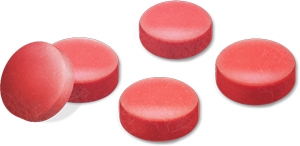The importance of iron in human metabolism
Iron is important for human life. It is found in every cell of the human body. Iron is essential to manufacture hemoglobin found in the red blood cells and myoglobin found in muscles. These two are oxygen-carrying proteins. Hemoglobin carries oxygen from the lungs to different parts of the body. Myoglobin stores a supply of oxygen in the muscle cells. It is responsible for the distribution of oxygen in the muscles, including the heart. Thus we can say that the essential function of iron in the human body is to enable cell respiration. Iron is also required for the synthesis of neurotransmitters such as dopamine, norepinephrine, and serotonin.
Broccoli and Non-Heme Iron

Two-thirds of the iron present in the human body is found in hemoglobin. The remaining is distributed between myoglobin, other proteins, and enzymes that assist in biochemical reactions and require iron for that purpose. Benefits of having adequate iron in the body include better ability to fight infections, decreased fatigue and improved alertness, and improved pregnancy outcomes. Results of iron deficiency – Iron deficiency can interfere with the normal functioning of body organs. This happens when hemoglobin, which is essential for oxygen circulation, cannot be formed because of insufficient iron in the body. Constipation, fatigue, sleepiness, irregular menstruation, poor appetite, inflammation or infection of the tongue, depression, and hair loss can result from iron deficiency anemia.
Iron Supplementation Post Bariatric Surgery
Roux-en-Y gastric bypass changes the way that food travels through the body. Iron supplementation is important because in a normal individual, only 5-15% of iron is absorbed after ingestion. Iron is typically absorbed in the duodenum and proximal small intestine. This part of the intestine is what is typically 'bypassed' during laparoscopic gastric bypass. For these reasons, it is very important to supplement your diet with iron.
Iron Supplements

Research has shown that individuals, particularly children, with a higher BMI than normal are prone to iron deficiency. In other words, being overweight or obese increases your risk of being iron deficient as well. The underlying reason for iron deficiency is the same, although various factors may contribute to it. A poor diet that provides insufficient dietary iron for body needs can result from poverty, lack of knowledge, unhealthy eating habits, and also frequent restrictive diet programs that obese individuals may undertake in order to lose weight. Anemia is one of the most harmful potential fallouts of iron deficiency and obese individuals need to guard against it. However; as yet there is no causal relationship established between weight status and deficiency of iron. This said, researchers are investigating the effect of increased levels of hepcidin in obese individuals. It is one of the factors associated with decreased iron levels with excessively obese individuals.
Bariatric surgery and iron supplementation
The periodicity of nutritional status surveillance varies with the type of bariatric surgery performed. 50% of the subjects that have undergone an RYGB procedure report positive for iron deficiency. As a matter of fact, the risks of iron deficiency increase with time and the condition can last for up to seven years and more after an RYGB procedure. Iron supplementation is usually administered orally. The dosage varies with the patient and type of surgery. For example, menstruating women that have undergone malabsorptive bariatric surgery need to be particularly cared for regarding iron deficiency. Women with menorrhagia or heavy bleeding during menstruation are at greater risk of post-operative anemia.
Iron is a very important for oxygen transport

If oral medicine is not enough to correct iron deficiency, it can be supplemented by or replaced with Intravenous iron infusion with iron dextran, ferric gluconate, or ferric sucrose. Also iron supplements that are given orally are not readily absorbed by the system; intramuscular injections are painful. Since the objective is to enable the patient attain normal hemoglobin levels, regular monitoring of hemoglobin levels is advised. Research shows that low-dose iron supplementation can help prevent iron deficiency but not always prevent iron deficiency anemia.
It is also common for patients to have a decreased hemoglobin count post surgery. The reason for this is that the lower portion of the stomach and the absorptive surfaces of the duodenum and upper jejunum which are associated with the liberation and absorption of heme are bypassed during bariatric surgery. If the iron, folate, and vitamin B12 readings are normal then any anemia typically resolves on its own after a few months. The clinical feature that points to iron deficiency is anemia. The condition can be managed by giving the patient ferrous fumarate, sulfate, or gluconate. Elemental iron, vitamin C, and folic acid should also be given.
Iron and how other nutrients affect absorption
Vitamin C helps in iron absorption. It should be given separately if it is not a part of the supplement. tannins, calcium, polyphenols, and phytates decrease the absorption of non-heme iron. Heme or non-heme iron absorption can be inhibited by up to 60% when iron supplements are taken along with calcium supplements that include calcium carbonate,calcium citrate, and calcium phosphate and also with dairy products.
It is important to keep in mind that an iron deficiency anemia after bariatric surgery can also include protein, copper, and selenium deficiencies. Therefore, every time a patient is tested for iron, vitamin B12 and folic acid, it is advisable that he also be screened for the above mentioned deficiencies. The medical practitioner's approach to managing micronutrient deficiency will also depend upon preoperative evaluation of iron status. Research has shown that up to 44% of the candidates for a bariatric procedure can be iron deficient. If the deficiency is deemed clinically significant, i.e. anemia is detected, then appropriate preoperative treatment measures have to be taken.
Supplementation of other micronutrients to offset malabsorption should always be taken into consideration. For instance, excessive zinc supplementation can lead to copper-deficiency related anemia which may be wrongly diagnosed as iron deficiency anemia. Increasing iron supplementation may expose the patient to iron overload and also organ damage. Post-surgery marginal ulcers between the stomach pouch and the small intestine often result in blood loss and iron deficiency.
Sources of dietary iron
Food sources of iron can be differentiated into two categories – heme iron and non-heme iron. Heme iron is better absorbed by the human body as compared to non-heme iron. Meat, fish and poultry are excellent sources of heme iron. Plant foods, cereals, and lentils are sources of dietary non-heme iron. Vegetarians and vegans have a wide range of food items to choose from for their daily intake of dietary iron however it is definitely more challenging. Iron intake should be particularly high if absorption is hampered as in the case of post-bariatric surgery patients.
Iron supplementation
Oral iron supplements are recommended for people that cannot maintain the desired levels of iron in the body through diet alone. Iron in the supplements is available in the form of ferric or ferrous iron; the latter being easier to absorb. The supplements can be consumed in the form of pills, regular tablets and capsules, syrups and liquids, and finally coated tablets for delayed release. Iron supplementation pills are prescription medicine containing varying amounts of elemental iron – the iron used by the human body. Regular tablets are the cheapest option and are also easily absorbed by the system. Liquids and drops are usually prescribed for children and individuals that have problems in swallowing pills. Coated tablets have fewer side effects but the iron is not absorbed as well as it is in other cases.
It is recommended that the iron be consumed in 3-4 small doses during the course of the day to aid absorption; this is because levels of intestinal absorption decrease with an increase in dosage. A 325 mg tablet of ferrous sulphate iron supplement contains approximately 50-60 mg of elemental iron. The usual recommendation for adults; apart from pregnant women, is one such tablet twice a day for a period of three months to treat iron deficiency anemia. However, as mentioned earlier, the dosage increases or decreases with the condition.
Common side effects of iron supplements include hardening of stool and constipation. Post-bariatric surgery patients should take this into account to prevent exertion when passing motions. A stool softener can be of help.









